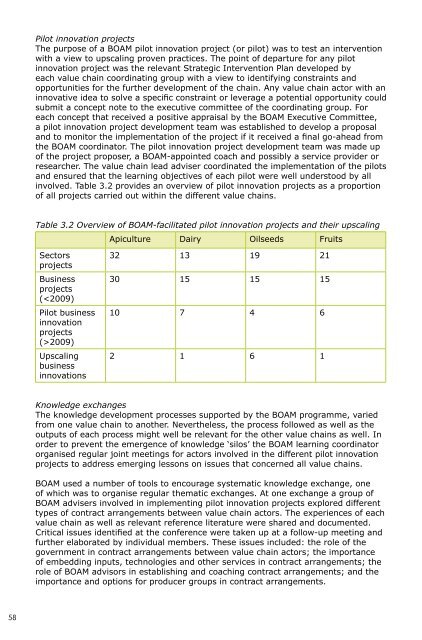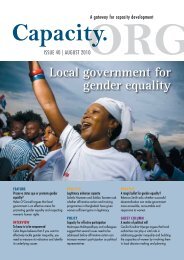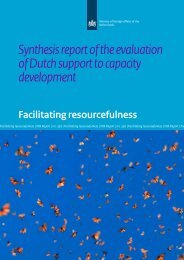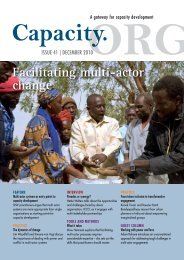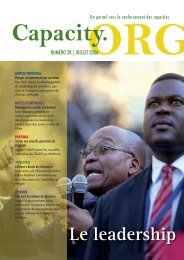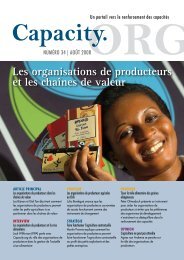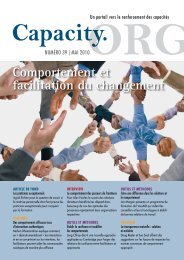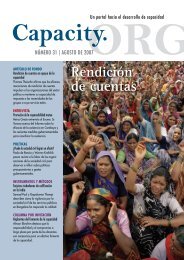Pro-Poor Value Chain Development - Capacity.org
Pro-Poor Value Chain Development - Capacity.org
Pro-Poor Value Chain Development - Capacity.org
You also want an ePaper? Increase the reach of your titles
YUMPU automatically turns print PDFs into web optimized ePapers that Google loves.
58<br />
Pilot innovation projects<br />
The purpose of a BOAM pilot innovation project (or pilot) was to test an intervention<br />
with a view to upscaling proven practices. The point of departure for any pilot<br />
innovation project was the relevant Strategic Intervention Plan developed by<br />
each value chain coordinating group with a view to identifying constraints and<br />
opportunities for the further development of the chain. Any value chain actor with an<br />
innovative idea to solve a specific constraint or leverage a potential opportunity could<br />
submit a concept note to the executive committee of the coordinating group. For<br />
each concept that received a positive appraisal by the BOAM Executive Committee,<br />
a pilot innovation project development team was established to develop a proposal<br />
and to monitor the implementation of the project if it received a final go-ahead from<br />
the BOAM coordinator. The pilot innovation project development team was made up<br />
of the project proposer, a BOAM-appointed coach and possibly a service provider or<br />
researcher. The value chain lead adviser coordinated the implementation of the pilots<br />
and ensured that the learning objectives of each pilot were well understood by all<br />
involved. Table 3.2 provides an overview of pilot innovation projects as a proportion<br />
of all projects carried out within the different value chains.<br />
Table 3.2 Overview of BOAM-facilitated pilot innovation projects and their upscaling<br />
Sectors<br />
projects<br />
Business<br />
projects<br />
(2009)<br />
Upscaling<br />
business<br />
innovations<br />
Apiculture Dairy Oilseeds Fruits<br />
32 13 19 21<br />
30 15 15 15<br />
10 7 4 6<br />
2 1 6 1<br />
Knowledge exchanges<br />
The knowledge development processes supported by the BOAM programme, varied<br />
from one value chain to another. Nevertheless, the process followed as well as the<br />
outputs of each process might well be relevant for the other value chains as well. In<br />
order to prevent the emergence of knowledge ‘silos’ the BOAM learning coordinator<br />
<strong>org</strong>anised regular joint meetings for actors involved in the different pilot innovation<br />
projects to address emerging lessons on issues that concerned all value chains.<br />
BOAM used a number of tools to encourage systematic knowledge exchange, one<br />
of which was to <strong>org</strong>anise regular thematic exchanges. At one exchange a group of<br />
BOAM advisers involved in implementing pilot innovation projects explored different<br />
types of contract arrangements between value chain actors. The experiences of each<br />
value chain as well as relevant reference literature were shared and documented.<br />
Critical issues identified at the conference were taken up at a follow-up meeting and<br />
further elaborated by individual members. These issues included: the role of the<br />
government in contract arrangements between value chain actors; the importance<br />
of embedding inputs, technologies and other services in contract arrangements; the<br />
role of BOAM advisors in establishing and coaching contract arrangements; and the<br />
importance and options for producer groups in contract arrangements.


